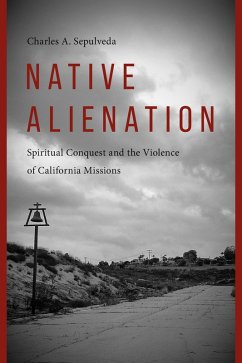Challenges the romantic portrayal of Spanish missions
Sites of slavery and spiritual conquest, the California missions played a central role in the brutal subjugation of the region's Indigenous peoples. Mainstream California history, however, still largely presents a romanticized portrait of the creation of the twenty-one Spanish missions between San Diego and Sonoma in the late eighteenth and early nineteenth centuries. Providing a corrective to this benign historiography, Charles A. Sepulveda reconstructs the violence toward Native people as well the resistance and refusals of his ancestors and other Native people during and after the Spanish genocide.
The conquest enforced the attempted spiritual possession of Native souls and the physical position of Native bodies and the land. At the same time, it strengthened the Spanish view of California's Indigenous people as disposable. Sepulveda demonstrates how enslavement was a key method of conquest, putting to rest the myth of the Spanish as benevolent and beneficial. Centering the experiences of Native peoples, Sepulveda brings to light the gendered dimensions of the conquest and genocide. His fuller history confronts the erasure of Indian individuality and resistance and historicizes the relationship between enslavement, dispossession, and environmental degradation. He also illuminates the mission system's central role in destroying Indigenous people's relationships to the land while examining the practice's centuries-long impact on the lives of Native people.
A groundbreaking reconsideration, Native Alienation transforms our understanding of California Indian history.
Sites of slavery and spiritual conquest, the California missions played a central role in the brutal subjugation of the region's Indigenous peoples. Mainstream California history, however, still largely presents a romanticized portrait of the creation of the twenty-one Spanish missions between San Diego and Sonoma in the late eighteenth and early nineteenth centuries. Providing a corrective to this benign historiography, Charles A. Sepulveda reconstructs the violence toward Native people as well the resistance and refusals of his ancestors and other Native people during and after the Spanish genocide.
The conquest enforced the attempted spiritual possession of Native souls and the physical position of Native bodies and the land. At the same time, it strengthened the Spanish view of California's Indigenous people as disposable. Sepulveda demonstrates how enslavement was a key method of conquest, putting to rest the myth of the Spanish as benevolent and beneficial. Centering the experiences of Native peoples, Sepulveda brings to light the gendered dimensions of the conquest and genocide. His fuller history confronts the erasure of Indian individuality and resistance and historicizes the relationship between enslavement, dispossession, and environmental degradation. He also illuminates the mission system's central role in destroying Indigenous people's relationships to the land while examining the practice's centuries-long impact on the lives of Native people.
A groundbreaking reconsideration, Native Alienation transforms our understanding of California Indian history.
Dieser Download kann aus rechtlichen Gründen nur mit Rechnungsadresse in A, D ausgeliefert werden.









